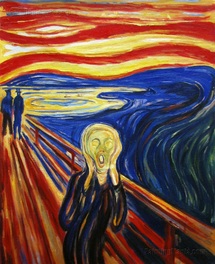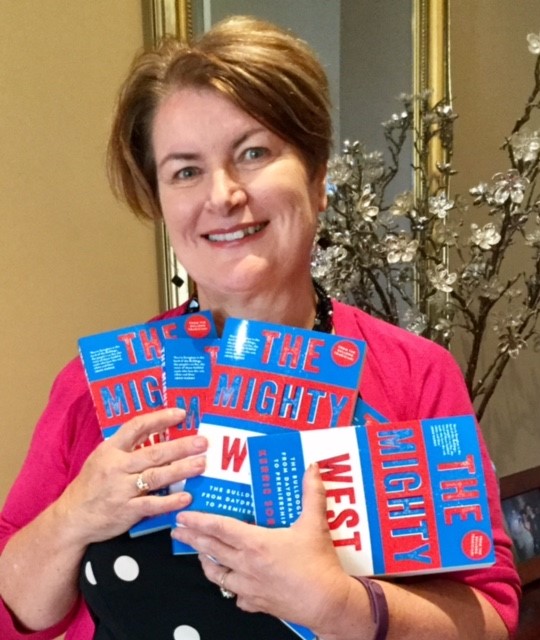|
In a Tragician exclusive, it can be revealed that Australian scientists have been collecting evidence of a baffling new syndrome: Post Seasonal Affective Disorder. While the garden-variety Seasonal Affective Disorder has been well documented as afflicting general members of the community when they experience the transition to the winter months, there has been a burgeoning trend in its little-known football-related variant.  The Post SADs are striking down footy fans, though, not as winter approaches, but as September passes - the season where the sports pages shrink, the Premiership Cup has been handed out, and others become excited about the dreary prospect of horses running around a racetrack. Bulldogs supporters have been identified as the epicentre of the newly developing epidemic. Researchers hypothesise that their 59-year premiership drought has made them particularly susceptible. Their immune systems are already compromised by harrowing experiences such as … well, we don’t need to go into them here, do we? While individual symptoms can vary, case studies on Bulldogs’ supporters, including those close to the Tragician, have shown that there is a reasonably consistent pattern of pathology, consisting of seven inter-related but distinct phases. Phase One: restless irritation, childish envy, petty behaviour Key phrase: ‘Sixty Years. Sixty bloody years. Sixty $%#@ing years!’ For Bulldogs’ sufferers, the onset of Post SAD disorder often strikes early, even while the finals are still playing out. These patients resort to hollow laughter when Richmond and Collingwood get bundled out in the first week, speeding up in their cars when spotting fans of other clubs crossing at pedestrian crossings in Grand Final Week. and giving noisy sighs of impatience when these fortunate supporters lament that this year's Grand Final Parade wasn't a patch on last year's. Identified triggers include: the complacent Hawthorn supporter interviewed on TV the day after the 2013 premiership, who could not name how many flags his team had won, and spotting an 'I am Carlton' sticker. Sufferers should not be approached by others, especially fans of successful clubs, in this phase. In some of the more serious cases, there are wild threats to switch allegiances. This is potentially catastrophic in the situation of vulnerable young supporters, whose indoctrination program by parents might not yet have been complete, or where family dysfunction has meant there is a non-Bulldogs parent in the home. In even more extreme cases, adult patients enter a delusional state, writing blog posts where they claim to foresee a 2016 premiership ( see here for a particularly disturbing example). These people are probably beyond rational assistance. In 1997, a particularly virulent strain affected hundreds of Bulldog fans who, still recovering from The Preliminary Final That Must Not Be Named, pinned their hopes on the Socceroos’ World Cup campaign and turned up a few weeks later to the MCG to watch their ill-fated attempt to qualify. Many of these are now sadly considered intractable. Phase two: grieving, self-pity Key phrase: ‘I will NEVER love another player as much as I loved Daniel Cross!’ While less antagonistic, sufferers have now become morose, petulant and generally unpleasant to be around. (A bit like the drunk you can't get rid of at a party). They refuse to countenance the idea that any Bulldogs' players can switch clubs, or should retire, no matter how decrepit they evidently are, or how much the patient has actually dismissed them as 'past it' during the season. Symptoms include running out of the room when faced with footage of a formerly loved player happily donning another, despised guernsey; and grandiose, teary declarations such as: ‘There will only ever be one Number Four for me.’ (Nonetheless, when asked who wore number six before Luke Dalhaus, vague answers are supplied: ‘Hang on, I remember him – smiley guy….wait, it’s coming to me!’) Conversely, sufferers become hysterical about the idea of trading away chronically injured or psychologically fragile under-performers, being obstinately convinced that the VERY moment that the club gives up on Shaun Higgins or Jarrad Grant will be the time where they finally get their bodies or mindsets right and become match-winning superstars for another team. Phase three: anxiety, fear, doubt Key phrase: ‘We will screw things up in the off-season.’ This phase involves obsessive-compulsive perusal of the newspapers to check whether the Bulldogs have overnight announced that Ryan Griffen will be swapped for an unknown but ‘athletic’ outside runner, or that Jake Stringer is to be traded for a 210 cm, 52 kilogram string-bean 'development player' who once bagged five goals in the Horsham Under 12s. Anxiety levels also soar when headlines blare about footy players behaving badly. It can take some time for sufferers to settle down and be persuaded that Tom Williams and Daniel Cross dived into the Hong Kong Harbour to SAVE a drowning woman, not be involved in a childish prank involving short-statured people. (When questioned by support staff or carers about these notions, patients begin rambling about ‘Captain Gronewegen’ and ‘Tony Buhagiar.’) Phase four: optimism Key phrase: ‘Our new recruits all look awesome! They're great blokes too!’ After taking minimal interest in the machinations of the draft, the sufferer of post-SADs suddenly breaks out of his or her listless torpor and tunes in to admire the new recruits with their dorky pimply smiles. There is avid reading of statistics and Emma Quayle's summary of their strengths. This confirms that they are superstars who will definitely form the backbone of the next Bulldogs’ premiership team. This is a testing phase where patients are at risk of veering back into the delusional state of Phase One. Next thing you know the sufferer is saying: ‘Wow!! doesn’t that new guy look great in his number four jumper?’ More mature recruits who have previously been loathed are now merely misunderstood, or likely to undertake a radical change of character once they associate with our lovely young men. According to this line of thinking, Barry Hall, once he got the chance to hang out with Murph and Gia, became a gentle giant, helping teach Sudanese refugees to play footy at Ardeer Primary School. The footage of him decking Staker? Probably just a bad camera angle. Phase five: denial Key phrase: ‘Footy is just a game’. While superficially patients appear to be in recovery, this is actually one of the most dangerous phases. Resolutions are made to adopt a mature, thoughtful and insightful attitude to the natural ups and downs of football. The patient claims to be unaffected by injustices that affected their team, and adopts an unsettling pose of nonchalance and even, uncharacteristically, feigns generosity of spirit and sportsman-like behaviour. A source close to the Tragician can reveal these examples of just how insidious this phase can be: ‘I really don’t mind that Brian Lake won the Norm Smith medal. Good on him. He deserves it.’ ‘You know, those umpires in the 2009 preliminary final were just doing their job.’ 'Look, the Cost of Living Allowance is actually quite justified, otherwise how would the Swans ever get Buddy Franklin to live in Sydney near all those beaches and nightclubs?' ‘It mightn't be the Dogs next year, but you’ve really got to hope that Great Western Sydney starts to do well. For their fans as much as anyone. And to grow the game in new frontiers. That's important, right?’ For the loved ones of sufferers of Post-SAD, this can be a confusing and difficult time. If they venture agreement with any of the above, they are likely to be confronted by vicious mood swings and accused of having absolutely NO understanding of football. Phase seven: acceptance Key phrase: ‘Who’s playing in the Australian Open?’ Summer arrives. Sufferers are now accustomed to there being no football in the papers. They become contemplative, and have acquired a new, balanced perspective on life. There is a keen appreciation that there is more to life than football. These are signs that health is returning, and the worst danger has passed. Recovery is fragile, however. A setback may occur a sufferer decides to support Sam Stosur at the Australian Open. If this obstacle is overcome, though, the recuperating victim of Post SADs shows little interest in pre-season training, renounces the NAB Cup as a meaningless farce, takes advantages of cheap early bird airfares to plan overseas travel for the following September, and calmly acknowledges the fact that the Bulldogs are in a re-building phase. They will also state that 'watching the kids develop' will be satisfaction enough this year. The sufferer gives only a wry chuckle when hearing on the grapevine that Shaun Higgins is training the house down and Tom Williams is the fittest he's ever been. Enjoying this new-found zen-like acceptance, it's easy to drop one's guard. We end with a first-person cautionary tale from one sufferer: "You think you can handle the drive past the Whitten Oval, over Mount Mistake, where you have a great view of the ground. You tell people you're just on the way to Highpoint. It's a mere coincidence that the boys are out there training. "You allow your eyes to rove for a moment, from scowling at the 'I am Carlton' sticker on the car in front of you. You spot the boys doing a drill. It's clear that the guys have bulked up. With their snazzy off season haircuts and suntans, they look like a million dollars. "There's Tom Williams sprinting effortlessly down the wing, exchanging handballs with a superlatively fit looking Shaun Higgins. "Without warning, you find yourself turning into Barkly Street and heading to the Bulldogs' shop. It's time to buy a new number four badge."
2 Comments
Kate
23/10/2013 02:11:09 am
Oh dear! I have a bad case of phase three, about to move into phase four as soon as the Crameri deal gets done...
Reply
john
29/10/2013 12:27:42 pm
This is superb!
Reply
Your comment will be posted after it is approved.
Leave a Reply. |
About the Bulldog TragicianThe Tragician blog began in 2013 as a way of recording what it is like to barrack for a perennially unsuccessful team - the AFL team, the Western Bulldogs. Categories
All
Archives
August 2023
|

 RSS Feed
RSS Feed